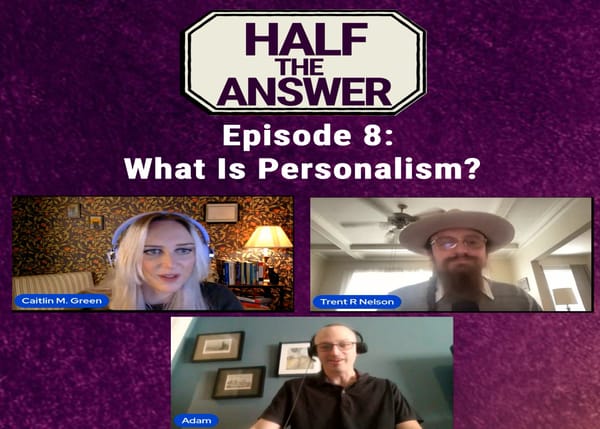Partisanship, Popper, and Painfully Hot Takes

Here’s something I’m ashamed of: Sometimes when I see a movie or read a novel and I’m not sure how to react, I search for reviews hoping they’ll tell me how. I can’t speak for anyone else, but the reason I don’t like what Adam Gurri referred to as (the political side of) “hot take culture” in his June 22nd piece here is the same reason I’m ashamed of this practice. It’s an easy way out, a way of avoiding the responsibility of independent thought about a hard problem on the concrete level.
Gurri is right to say that partisanship invigorates democracy and participatory processes in general. Science, as he notes, is often quite partisan. The right way to understand the partisanship of science, in my view, is the critical rationalism of Karl Popper. Popper wrote that falsification, not confirmation, was the essence of scientific progress. Competing theories and research programmes develop side by side, gaining structure and making predictions about the world, until enough of those predictions are proven false, at which point a theory is acknowledged to be inadequate.
One crucial element of this process is that there must be a certain amount of intersubjective agreement when it comes to what counts as a falsification of what. This is not an easy problem. The Duhem-Quine thesis states that hypotheses cannot be tested in isolation; rather, hypotheses are “bundled” with auxiliary assumptions, and so something of a judgment call is required to determine what has been falsified when a prediction is incorrect. In fact, Quine believed, at least at one point, that even logic and mathematics could be falsified by a scientific experiment.
Another element of this process is that concrete, empirical facts have ultimate reign over theories. If an experiment contradicts a well-regarded theory in an unexpected way, we might run the experiment a few more times to make sure we got the right result. But there is no option for us to pick the theory over the fact when they conflict. This stands in contrast to, for instance, the “reflective equilibrium” of ethics. In ethics we accept the possibility that our intuitions about what ought to be done, or to be the case, are sometimes wrong. We call those intuitions into question when they come into clear enough conflict with our candidate ethical theories. But experiments aren’t “ours” to alter.
The problem with hot takes, and “hot take culture,” is that they violate both of these norms. Demonstrating this will require presenting hot takes in a certain way, but I think this presentation will differ from Gurri’s only in emphasis, not in content.
My picture of hot take culture
Consider the following scenario: something happens in the world. Most of us are, as I was after reading a confusing novel or watching a confusing movie, still trying to make sense of this thing. We haven’t figured out whether it’s good or bad; we haven’t determined what its implications are; we haven’t decided whether or not it counts as evidence for or against some theory or value we hold. We are processing it.
As we are processing it, other people are writing. Are they people who have already processed the event the way we’re trying to? Not really. Instead, they are people who are devoted enough to a certain theory to think the correct reaction is whatever they can derive from that theory and who are clever enough that they can perform that derivation quickly.
The “hotness” of the take comes from the speed at which it’s produced and the superficial way in which it addresses the event. The superficiality is a feature of derivation itself. The event is presumably newsworthy in part because it involves complex issues that can be seen from multiple perspectives or that could have multiple effects. The theory, as part of being broad enough that it can generate a hot take for almost any event, cannot anticipate this complexity, and so the derivation necessarily fails to address it.
How hot take culture violates our norms
Instant derivations from a grand theory violate both of our norms above. By refusing to consider deeply the substance and complexity of an event before reacting, hot-takers deny themselves the possibility of reconsidering their longstanding theories in new light. In another sense, however, the complexity of events allows hot-takers to renege on what might have seemed like unspoken agreements about what would falsify what. There is always some detail that can be magnified into a nuclear take.
One example given in 2015 in Elspeth Reeve’s A History of the Hot Take at the New Republic came during the 2013 Miley Cyrus “twerking” fiasco, when, apparently, the inventor of the foam finger felt the performer had “degraded” the “honorable icon”. Even people who take seriously the already hot-take-y controversy – cultural appropriation and sexual exhibitionism are quintessential hot-take topics – would be hard pressed to care about the fact that it involved a foam finger. And yet, in just a slightly different world, we can imagine complaints that “the foam finger has a history and it’s being erased,” or about the abuse of its inventor’s intellectual property, or some other such nonsense.
One good example just today from the Twitter account @NuclearTakes, itself not always impartial, is a tweet from Dinesh D’Souza, who calls a photograph of Chuck Schumer patting John McCain on the back after the 49-51 ACA repeal vote “[a] sickening display of political homoeroticism”. It is difficult for me, at least, to summon the theory of mind necessary to imagine even from D’Souza’s perspective what that picture, or the healthcare vote more broadly, might have to do with any sort of homoeroticism. But deeply strange cognition is no obstacle to authoring hot takes. It is instead a boon: D’Souza manages in one paroxysm of unhinged free-association to integrate an erstwhile element of the “culture wars” into a condemnation of a Senate vote whose outcome he didn’t like. Common headline formats reflect this pattern: “Actually, [Bad Thing] Is Good”; “[Bad Thing] – And That’s a Good Thing, Too”; “[X] Isn’t About [What It’s Clearly About]. It’s About [Something People Get Really Angry About]”. On Twitter this is routinely satirized by saying: “i LIKE that [person] did [bad thing]”.
What does this mean for our political discourse?
I offer my account of hot take culture not simply to rebut Gurri. I believe it can augment, if not replace, some commonplaces about what’s wrong with our political discourse. Eight months ago, for instance, many people, including myself, were quite certain that online media, especially social media, was effecting an “epistemic bubble” which enabled consumers to engage only with views with which they already agreed. This sort of stance is maybe most strongly associated with Cass Sunstein, who first articulated it in Republic.com in 2000; that book was followed by the very similar Republic.com 2.0 in 2007 and #Republic this year. However, studies seem to have shown that social media usage is actually correlated with greater engagement with opposing views. So those of us with the intuition that it increases American polarization need a different explanation as to how.
Here, then, is my explanation. The normal human state is to hot-take events for oneself only sometimes and only to a degree. Without the supposed aid of outlets like Vox, which “explain[s] the news” to us, we would interpret many concrete events far more directly and, in at least a limited sense, pre-theoretically. Having done so, we could engage in a process of falsifying our political theories either to make them more nuanced or to reject them entirely. We might even start to embrace a kind of pluralism, in which no theory so far seems good enough to explain every event but certain theories are better than others when it comes to their ability to model certain kinds of situations. However, hot takes provide a way to avoid all that work. They provide interpretations of concrete events that, no matter how intuitively unnatural they are, remain theoretically safe. Perhaps it is the presence of and easy access to such interpretations, rather than the absence of others, that produces epistemic closure.
Gurri writes that “[t]he conflict necessary to generate fresh theoretical resources is pursued, in the political arena, almost exclusively by partisans.” Maybe so. But it remains to be shown that hot take culture generates, or is even capable of generating, fresh theoretical resources in the first place. What’s far more likely, in my view, is that it tends to use worn-out theories to generate “takes” that are fresh only insofar as they pare down events past the point of recognition. One needn’t be an idealist about deliberation to think this might damage a polity’s shared sense of reality and the belief that all its members inhabit a common world.
Featured image is Ulysses and the Sirens, by John William Waterhouse.




